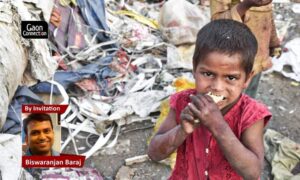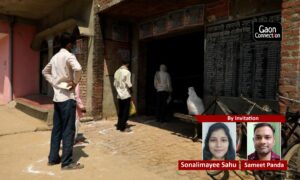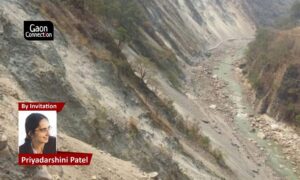When is a good time to talk about the rights of India’s frontline health workers? The short answer is that there has never been a more appropriate time than now.
Nearly a million female community health workers are on the frontline of the country’s COVID-19 response. In recent days, these overworked and underpaid frontline health workers, known as ASHA (Accredited Social Health Activists), have faced violence and intimidation in the line of duty.
The repeated attacks on doctors and frontline health workers who are doing their job during a pandemic prompted the Central government to amend its emergency epidemic law. Such attacks are now punishable by up to seven years in prison.
But an amendment in the law or strict vigilance is unlikely to make a huge impact unless we also simultaneously address the underlying structural reasons that make them vulnerable.
The conversation around the safety and wellbeing of the frontline community workers who are doing their job, sometimes without adequate protection, needs to change.
The core issue is vulnerability and their perceived weakness. As well-known public health advocate Anant Bhan pointed out: “ASHAs are structurally vulnerable to intimidation because they are perceived to have low status – they are female, at the base of the hierarchical health system, often not rich, not formally employed by the health establishment and are not salaried workers.”
Many of the ASHA workers who have faced violent attacks in recent days were carrying out tasks allotted to them in a communally polarised, vitiated atmosphere. For example, in Bengaluru, ASHA workers were assaulted when they visited a locality as part of disease surveillance and were collecting data about persons with coronavirus-like symptoms. According to the news reports, while on field duty, they heard an announcement on a loudspeaker, asking people not to cooperate with the health officials. One ASHA worker told the media that she and her team of data gatherers were surrounded by a mob. She was abused and her bag was snatched. Luckily, one ASHA worker managed to phone her son who got in touch with the local corporator and the health workers were rescued by the police.
In another instance, a 39-year-old ASHA worker was attacked in Faridabad, Haryana, while going door-to-door surveying households about coronavirus symptoms and contact history.
There have been many other instances in recent weeks where frontline health workers have come under attack for just doing their job.
These attacks have mostly been cases where the ASHAs stepped out of the areas where they usually work and have been asked to go to neighbourhoods where they are not known and where they can be seen as prying outsiders. This heightens their vulnerability, says Sulakshana Nandi, the joint national convener of the Jan Swasthya Abhiyan (JSA).
But rural India, where ASHAs play a critical role and where they are usually known to most villagers, is not necessarily going to be a safe haven.
In normal times, their responsibilities include identifying and registering new pregnancies, births and deaths, mobilising, counselling and supporting the community to demand and seek health services, identifying, managing or referring cases of illness, supporting health service delivery through home visits, first-aid and immunisations sessions, maintaining records and participating in community-level health planning.
In the coming days, as more and more migrant workers head back to their villages, the workload of ASHA workers is going to increase. State governments across the country will depend on the network of ASHA workers to trace people with travel history, as well as those who have come in contact with such people. Given the very large number of people who fear being quarantined and stigmatised if they are diagnosed Corona-positive, many may want to hide their travel history. Any cross-questioning may make them aggressive and jeopardise the safety of ASHA workers. And, of course, the more homes they visit, the higher the chances of ASHA workers being infected themselves.
Apart from bringing in law, what is being done to make sure that these community workers – the mainstay of the public healthcare system in rural India – are protected and respected?
Health activists are flagging the issues that need to be addressed with urgency.
“Health workers at the community level, such as ASHAs, who are deployed either for COVID-19 outreach and community awareness or for routine community-level work such as immunisation, are also facing higher risk of exposure to the virus. Hence, the rights and protection against the risk of health workers on the one hand, and the robustness of the health system on the other, and the policies with regard to testing, all deeply intersect in the times of COVID-19,” notes a recent position paper, Health Workers’ Rights in the Time of COVID-19, by the JSA, All India People’s Science Network and the Public Services International India National Coordination Committee.
“Any strategy to fight the pandemic should consider the rights and protection of health workers. This must include the provision of adequate PPE (personal protective equipment), access to testing and treatment needs. It is urgent to protect health workers against stigma, violence, discrimination and sexual harassment. But while there has been much official verbal appreciation about the work that frontline health workers are doing currently, statements of good intent are not enough,” the paper asserts.
ASHAs are told they are ‘volunteer’ activists and not workers of the health system. They are thus denied a minimum wage and any other rights of a worker under the law. As health workers across the health system have been mobilised to respond to the pandemic, the pre-existing cracks and weaknesses in the system make it all the more fragile. Informal employment leads to unclear responsibilities towards workers, and has created blind spots in the system. ASHAs and community health volunteers (CHV) have been deployed for case identification without adequate safeguards, the paper notes.
It argues: “The government pretence that ASHAs are not workers of the health system amounts to discrimination against an exclusively female workforce that is paid a fraction of the prevalent minimum wage. The Central and State governments should make the required budgetary allocations to ensure that ASHAs and other health workers deployed to respond to the emergency situation are provided the remuneration they deserve, and at least as per the law. Such allocations should be incorporated in subsequent annual budgets.”
COVID-19 Preparedness checklist for rural primary health care and community settings, prepared by a volunteer group of public health researchers, practitioners and experts in India, also flags the critical issue of health worker wellness. “The social process around a pandemic means that frontline health workers will experience stigmatisation, isolation and be socially ostracised. During previous pandemics, many health workers were not being allowed to use the village well, asked to leave their rented accommodation, and not allowed to use public transport. Health workers often isolate themselves from their families to protect them from infection to respond to their call for duty. Like the general public, health workers might also struggle to get their own essential supplies.”
It is therefore important to be prepared for this and develop plans, the researchers say. “Health workers can be overwhelmed with both the surge in cases as well as poor outcomes to treatment in some situations. It is important that the team leaders address this issue proactively and give adequate attention to mental health issues from the start,” the Covid-19 preparedness checklist recommends.
This is not just an expert-speak. Talking to several ASHA workers over the past week, one thing became very clear. They remain overworked and under-equipped. Many of them did not get any protective gear and had to make masks themselves. Many are handicapped because they don’t have transport. Every ASHA worker that I spoke to brought up their old demand for a minimum wage and a permanent job. Their concerns must be heeded.
Patralekha Chatterjee is an award-winning journalist/columnist, and photographer focusing on development issues. Currently, her writing focuses on the intersection of politics and public policy on a range of inter-linked development issues for Indian and international media.
(Views are personal)


















